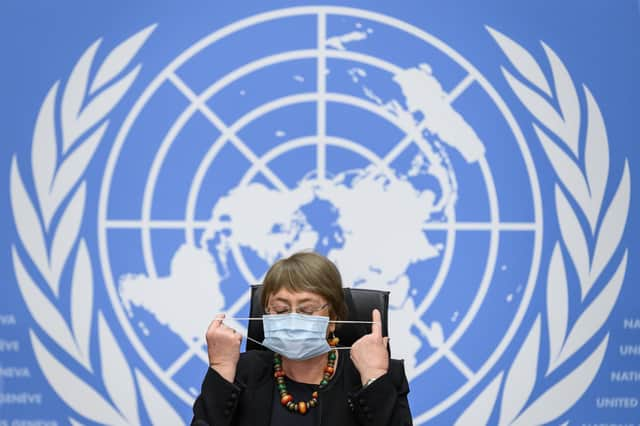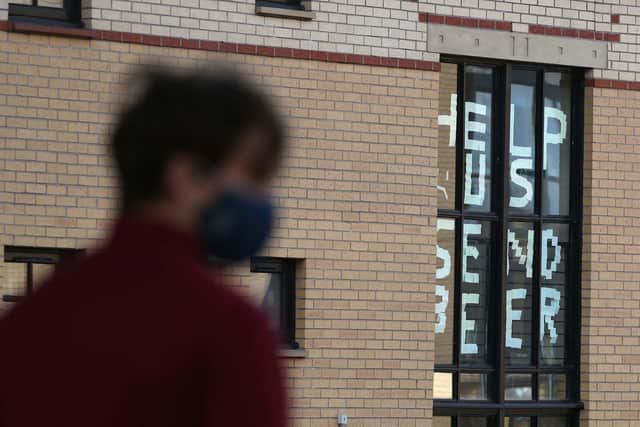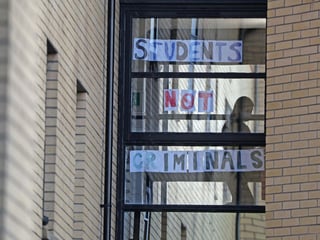Human Rights Day: What post-Covid Scotland should do to help ensure we all live freely with dignity and respect – Kavita Chetty


This year, we have all had our rights affected by Covid-19. Governments have faced extraordinarily difficult choices.
Calculated trade-offs have been made in a difficult balancing act between protecting the rights to life and to health, and other rights such as rights to freedom, family life, work and education. Human rights provide a compass to navigate these choices – a means of both informing and scrutinising decision-making. Rights can also help steer our approach to economic and social recovery as we move to 2021.
Advertisement
Hide AdAdvertisement
Hide AdAs a society, in Scotland, we are unaccustomed to the state restricting our lives such as it has this year. Yet even in these times of crisis, democracy, the rule of law and human rights have remained in place. The rule book did not disappear this spring – in fact it has been referred to more than ever in assessing the parameters and necessary reach of state power.
Striking the right balance
Nonetheless, it has been a devastating year for some and a challenging year for us all. Thousands of people have died as a result of Covid-19 and their families have lost loved ones. People have lost their livelihoods and income; disabled people have lost vital supports, as have unpaid carers; people’s mental and physical health has suffered as a result of isolation and reduced availability of health services; women have experienced increased domestic violence; children have missed education; and older people have been deprived of family life.
In Scotland, as elsewhere, frequent questions are being asked about whether government is striking the right balance. Human rights law requires each and every measure to be questioned. Which rights are at stake? Are restrictions strictly necessary, proportionate and time-bound? Are there less restrictive alternatives? Are people in vulnerable circumstances being put at risk? What positive steps must be taken for the upholding of rights?


These questions of balance are going to stay with us for a long time. Some will undoubtedly be the subject of litigation. Others will be the subject of inquiry or investigation. We will need to examine whether transfers from hospitals to care homes had appropriate safeguards in place to protect rights.
We will look back at whether the rights of students arriving at university residences were appropriately considered, and necessary supports put in place. It will be important to assess whether restrictions on care home visits are proportionately weighing up the right to family life and psychological well-being of residents with the protection of life and health.
Tackling inequality
Looking ahead to 2021, with vaccines on their way, we are going to have a double challenge of navigating our way out of the crisis period and re-building our society and economy. A return to business as usual is not an option.
Before the pandemic, things were not working for everyone, nor our environment. Planning for economic and social recovery provides an opportunity to reset priorities and chart a more resilient, sustainable future. Tackling inequalities, laid bare by the impacts of the virus, must be at the heart of how we move forward, allied with the protection of our environment and planet.
The pandemic has highlighted the need for targeted attention and resources in areas such as health, social care and low paid, undervalued sectors of the economy. Realising everyone’s economic and social rights necessitates investment in these areas.
Advertisement
Hide AdAdvertisement
Hide AdThese rights, such as the right to an adequate standard of living, housing, food, health, education and social security, make explicit asks of law and policymakers. They require using all available resources to the maximum extent possible, to continually advance these rights.
Embedding rights into policymaking
Such rights are international obligations but currently are not enforceable in Scots law. A National Taskforce for Human Rights Leadership, led collaboratively by government, is considering recommendations for new human rights legislation in Scotland.
This new legislation would embed these international obligations into devolved policymaking and provide accountability where they are not upheld. A model for doing this has been established with the current United Nations Convention on the Rights of the Child (Scotland) Bill currently at Parliament.
The experience of the pandemic will inform how the taskforce also considers the rights in UN treaties of women, disabled people, older people, and black and minority ethnic people. This offers hope that rights can be considered more holistically and systematically in setting priorities, budgets and policies as we rebuild and recover.
An inter-connected world
Addressing the climate emergency must also be a pressing priority for our recovery. Climate change remains the most fundamental threat to humanity and our planet beyond the virus.
In November 2021, world leaders will come to Glasgow for the postponed UN Climate Change Conference of the Parties, known as Cop26. Here they will seek to come to collective agreements on tackling climate change.
This critical moment for the future of our planet will require building consensus and a focus on common goals. Again, human rights, as agreed international standards, can assist in steering this dialogue. Actions taken to combat, mitigate and adapt to climate change have the potential to impact on many of our rights, including in positive ways. Where these are accounted for we will all benefit, both in more developed states and those less economically developed.
Covid-19 has illustrated starkly the inter-connectedness of our world. The connections between countries, between people, and between humans and the environment.
Advertisement
Hide AdAdvertisement
Hide AdIn this connected world of polarised views and global challenges, an agreed set of standards, centred on the rights of those most in need, is to be cherished.
The virus has pulled us apart both literally and metaphorically. Human rights provide a means of bringing us together on common ground. Through human rights we can re-connect with shared goals and objective benchmarks – to uphold our humanity and ensure we can all live freely with dignity and respect.
Kavita Chetty is head of strategy and legal at the Scottish Human Rights Commission
A message from the Editor:
Thank you for reading this article. We're more reliant on your support than ever as the shift in consumer habits brought about by coronavirus impacts our advertisers.
If you haven't already, please consider supporting our trusted, fact-checked journalism by taking out a digital subscription.
Comments
Want to join the conversation? Please or to comment on this article.
